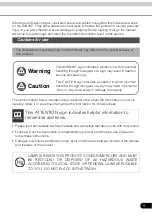
#
You can adjust parameters for each band of
the other speakers in the same way.
Note
You can store the adjusted setting in memory by
using
MEMORY
. For details concerning opera-
tion, refer to
Storing the adjusted audio settings in
Adjusting 13-band graphic
equalizer
For custom equalizer curves (
CUSTOM1
to
CUSTOM3
), you can adjust the level of each
band.
!
Custom equalizer curves can be created
common to all sources.
1
Touch ADJ. next to GRAPHIC EQ on the
sound setting menu.
2
Touch LR Common/LR Independent to
switch the equalizer adjustment method.
!
LR Common
–
Adjusts left and right speak-
ers simultaneously.
!
LR Independent
–
Adjusts left and right
speakers separately.
3
Touch EQ to select the equalizer.
Touch
EQ
repeatedly to switch between the fol-
lowing equalizers:
POWERFUL
—
NATURAL
—
VOCAL
—
FLAT
—
CUSTOM1
—
CUSTOM2
—
CUSTOM3
—
LAST MEMORY
—
SUPER BASS (S. BASS)
#
You can also select the equalizer by using
EQUALIZER LIST
.
#
To close the equalizer curve list, touch
CLOSE
.
#
You can select
LAST MEMORY
only when the
adjusted equalizer curve is not memorized in this
unit.
4
Touch
or
next to SPEAKER to select
the speaker to be adjusted.
Touch
or
until the desired speaker appears
in the display.
LEFT
(left speakers)
—
RIGHT
(right speakers)
#
If either the front or rear speakers has been
muted on the setting/adjustment items of the
sound setting display (refer to
flashes.
#
You can mute the selected speaker units by
touching .
#
When you want to cancel muting, touch
.
5
Touch
or
to select the equalizer
band to be adjusted.
Touch
or
until the desired equalizer band
appears in the display.
50
—
80
—
125
—
200
—
315
—
500
—
800
—
1.25k
—
2k
—
3.15k
—
5k
—
8k
—
12.5k
(Hz)
6
Touch
or
to adjust the level of the
equalizer band.
Each time you touch
or
it increases or
decreases the level of the equalization band.
+12dB
to
–
12dB
is displayed as the level is in-
creased or decreased.
#
When you adjust the speaker loudness with
selecting
LR Common
, the equalizer levels of
both side speakers are changed simultaneously.
Thus, if the equalizer level of one speaker is at
maximum or minimum, the level of the other
speaker is at full limit in opposite direction.
#
You can then select another band and adjust
the level.
Note
You can store the adjusted setting in memory by
using
MEMORY
. For details concerning opera-
tion, refer to
Storing the adjusted audio settings in
Audio Adjustments
En
90
Section
17















































